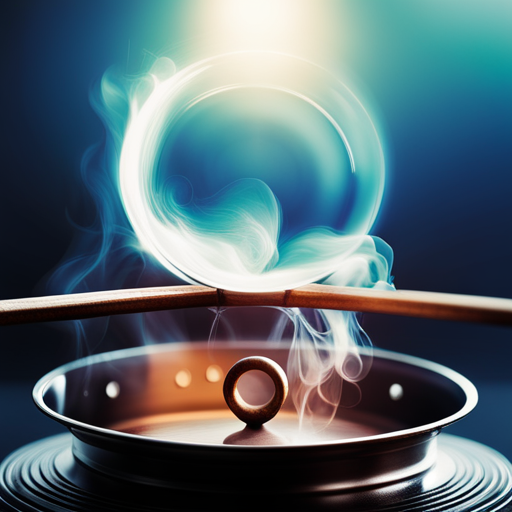Are you tired of dealing with the negative effects of hard water, like dry skin and faded laundry?
Boiling hard water is a common hack that many people turn to in order to temporarily soften it. But is it really a quick fix, or just a band-aid solution?
In this article, we’ll explore the chemistry behind boiling hard water and its temporary effects, as well as the various methods for permanently softening hard water.
First, let’s define hard water. It’s water that contains high levels of calcium and magnesium salts, which can cause a variety of issues in your household.
While boiling hard water can be a quick and easy fix, it’s important to understand that it’s only a temporary solution. In fact, boiling hard water actually increases the concentration of minerals in the water, making it even harder than before.
So, if you’re looking for a permanent solution to your hard water woes, you’ll need to consider other methods. Let’s explore some of the options together.
Key Takeaways
– Boiling hard water can temporarily soften it by increasing the solubility of calcium and magnesium salts.
– Soft water is low in minerals and is better for producing soap lather and preventing mild issues like dry skin and faded laundry.
– Boiling hard water is a quick and cheap way to temporarily fix hard water, but the salts return when the water cools down.
– Permanent solutions for softening hard water include reverse osmosis, ion exchange, and adding sodium bicarbonate, but boiling can be a natural and simple way to soften hard water.
What is Hard Water?
You already know that hard water contains calcium and magnesium salts dissolved as bicarbonates, chlorides, or sulfates. But what causes hard water in the first place?
Hard water is commonly found in areas with high mineral content in the soil, such as places with limestone or chalk bedrock. The minerals dissolve in the groundwater, which is then pumped into homes and businesses.
While hard water is generally safe to drink, it can have some negative health effects. The excess minerals in hard water can cause dryness of the skin and scalp, leading to itchiness and dandruff. Clothes washed in hard water can also fade quickly, and the fabric can wear out faster due to the mineral buildup.
However, boiling hard water can provide a temporary solution by increasing the solubility of the calcium and magnesium salts.
Temporary Softening with Boiling
When attempting to soften hard water through the process of heating, the minerals causing hardness in the water become more soluble and are able to be temporarily removed.
Boiling hard water is an effective way to quickly fix the issue of hard water in your home. It’s a simple process that can be done by anyone and requires no special equipment. Furthermore, boiling hard water is a natural and chemical-free way to get rid of the minerals that cause water hardness. However, it’s important to note that boiling hard water is not a permanent solution to the issue of hard water.
The minerals that cause hardness in the water will return to their original form as soon as the water cools down. Therefore, it’s only a temporary fix to the problem. Additionally, boiling hard water can have some drawbacks. It can be time-consuming and may require you to boil water frequently, especially if you have a large family or use a lot of water.
Furthermore, boiling hard water may affect the taste of the water and make it less palatable.
Permanent Solutions to Hard Water
One effective way to permanently soften the mineral content in your water is through the use of a water softener. This device works by removing the calcium and magnesium ions in hard water and replacing them with sodium ions. It’s the most common solution for hard water problems in residential areas.
There are two main types of water softeners: reverse osmosis and ion exchange. Reverse osmosis is a process where water is pushed through a membrane that filters out impurities, including minerals. Ion exchange, on the other hand, uses a resin bed to exchange sodium ions for calcium and magnesium ions in the water. Both methods are effective in producing soft water, but the choice between the two depends on your specific needs.
If you’re looking for a more natural way to soften your water, you can try using sodium bicarbonate instead of boiling it. Sodium bicarbonate, also known as baking soda, can neutralize the acid in water and reduce its hardness. Simply add a tablespoon of baking soda to a gallon of water and stir until it dissolves. This method is not as effective as water softeners, but it can be a good alternative for those who are looking for a cheaper and more eco-friendly solution.
In conclusion, while boiling hard water is a quick fix, it’s not a permanent solution. To permanently soften your water, consider investing in a water softener or trying a natural solution like sodium bicarbonate.
Conclusion
So, should you rely on boiling hard water as a permanent solution? The answer is no.
While boiling hard water can temporarily soften it, the effects are short-lived and won’t fix the underlying problem.
Instead, you should consider permanent solutions like reverse osmosis, ion exchange, or magnetic water treatment. Each method has its pros and cons, so it’s important to do your research and find the best option for your needs.
Ultimately, investing in a permanent solution to hard water can have long-lasting benefits for your health, home, and wallet.
So don’t settle for a quick fix – explore your options and find the best way to enjoy high-quality, soft water.
